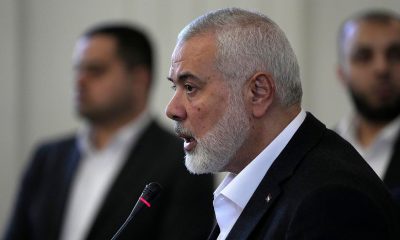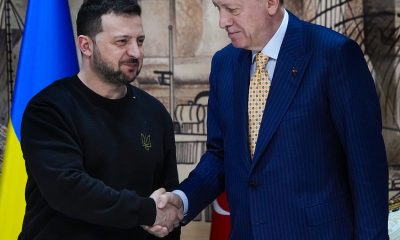General News
Is the EU ready for the increasingly likely democratic change in Turkey?

The opinions expressed in this article are those of the author and do not represent in any way the editorial position of Euronews.
A democratic change in Turkey matters to Europe and appears to be increasingly likely.
The upcoming presidential and parliamentary elections on 14 May have the potential to be the most consequential since the 1950 elections, which ended the single-party rule.
Declining support for the Justice and Development Party, AKP, combined with strong alliances in the opposition, could mark the end of the era of President Recep Tayyip Erdoğan.
According to several polls, Kemal Kılıçdaroğlu, the candidate of the six-party opposition alliance, is leading against Erdoğan.
A victory for Kılıçdaroğlu might signal the start of a new era of democratisation and Europeanisation in Turkey, as well as a chance to reset Turkey’s relations with the West.
A largely transactional relationship persists
The EU played a significant role in Turkey’s democratisation process following the Helsinki Summit in 1999 when Turkey was officially recognised as a candidate country for EU membership.
However, the nature of this relationship has become largely transactional, especially since “the refugee deal” in 2016.
The EU has made itself irrelevant by doing nothing else than expressing concerns over the developments in Turkey.
Instead of an approach based on values, the EU prioritised mutual interests and failed to adopt a clear policy against the AKP’s increasingly authoritarian style of governance.
Turkey’s detachment from the EU, coupled with the EU’s interests-based approach, had far-reaching political, economic, social and security repercussions for both sides, as well as wider regional and global implications.
A democratic change in Turkey could provide a new opportunity for Brussels to play a crucial role and reassert its relevance.
A new government in Turkey would definitely need the EU’s support to return to the democratisation path and tackle the ongoing economic crisis.
Some in Brussels need to reexamine their orientalist approach
This also presents a significant chance for the EU, as it confronts major challenges like the threat posed by Russia, dependency on China, energy crisis and democratic backsliding in some EU member states.
A renewed relationship between Turkey and the EU could and should be established following the elections based on democratic values.
Nevertheless, the critical question is whether the EU is ready for this prospect.
The prevailing understanding in Brussels, especially since the adoption of the presidential system in Turkey in 2017, is that a democratic change is unlikely to occur in the short- to mid-term.
Despite the victory of the opposition in the 2019 municipal elections, many in Brussels remain sceptical that presidential elections can bring about a democratic change, with some assuming that Erdoğan will always find a way to stay in power.
Consequently, the EU is not adequately prepared for a potential democratic change in Turkey.
This perspective not only reflects an orientalist approach that disregards the efforts of millions of Turkish democrats but also fails to acknowledge the fact that, despite all major issues, Turkey has a long-standing democratic experience with strong political parties and civil society.
Recent democracy and fundamental rights issues a convenient excuse
Although there are numerous unfair practices during the campaign period, elections in Turkey remain free, and parties and volunteers possess considerable experience in ensuring election security.
Given Turkey’s significance to Europe, the EU cannot afford to miss the opportunity to re-engage with Turkey in the event of a democratic change, and yet the EU currently lacks a clear strategy for such a scenario.
The EU’s lack of a long-term vision for Turkey could make the process of re-engaging with the country challenging. For some countries and Turkey-sceptic political groups, the current transactional relationship with Turkey is not entirely undesirable.
Despite complaints aboutErdoğan, this interest-based dialogue affords them the opportunity to avoid difficult decisions about the future of Turkey-EU relations.
While many in the EU have long been opposed to Turkey’s accession process based on cultural and religious arguments, the country’s recent struggles with democracy and fundamental rights have given them a convenient excuse to maintain a sceptical stance.
Should Turkey return to a democratic path, those sceptical of the country will need to find new justifications for their stance. In any case, maintaining the status quo will not be a viable option.
Turkey’s EU accession path has to be fully revitalised
In the event of Kılıçdaroğlu’s victory, what options does the EU have?
One relatively simple choice would be to initiate talks for the modernisation of the Customs Union, which both sides are eager to pursue and would be beneficial for both.
Nevertheless, this may not suffice.
Another crucial matter on the agenda is visa liberalisation, which could be more challenging in the short term due to possible resistance from certain EU member countries.
There are several other challenging topics between Turkey and the EU, including “the refugee deal”.
Kılıçdaroğlu intends to renegotiate the agreement to alleviate Turkey’s burden, as anti-refugee sentiments are growing in Turkey, and decreasing the number of refugees is a pledge of all opposition parties.
While the primary promise is to send Syrian refugees back by striking a deal with Bashar al-Assad, it is unclear how many would realistically return to the country.
The future of refugees in Turkey is a matter with potentially significant consequences for the EU and will undoubtedly be part of the post-election discussions with Turkey.
Sooner or later, a decision on Turkey’s accession process will be also necessary. Despite the numerous challenges, the EU has opted to leave the door open for Turkey, and this was the correct decision.
If the EU chooses to terminate the accession process when Turkey returns to the path of democracy, it could be viewed as a punishment for the millions of Turkish democrats.
Revitalising the process is another alternative, but achieving consensus to reopen new negotiation chapters and recommence the accession process will be a challenging task.
Threats to European security make strengthening relations with Ankara a priority
One may question whether Turkey can ever join the EU or if working towards a new type of strategic partnership could be a better option instead.
As a firm believer in the EU’s role in democratisation, I would support re-energising the accession process if and when the conditions are met.
Even if accession seems unlikely in the near future, engaging in the accession process can yield mutual benefits for both Turkey and the EU.
Considering global developments and threats to European security, the dynamics and the needs may quickly evolve.
Ankara and Brussels may actually need each other more than they realise.
Given all these factors, instead of taking a reactive approach, the EU should adopt a proactive stance and develop a comprehensive action plan to be implemented in case of a democratic change in Turkey.
It is imperative that the EU does not simply stand by and observe such a development.
Taking action is essential if the EU intends to assert its influence as a significant regional and global player.
Dr Demir Murat Seyrek is an adjunct professor at VUB (Free University of Brussels) and Senior Policy Advisor at the European Foundation for Democracy.
At Euronews, we believe all views matter. Contact us at view@euronews.com to send pitches or submissions and be part of the conversation.
Disclaimer: No copyright infringement intended. All rights and credits reserved to respective owner(s).
























